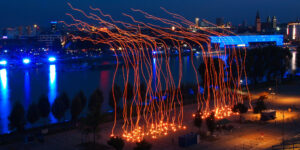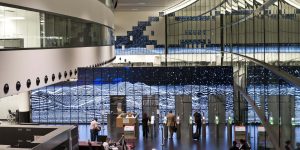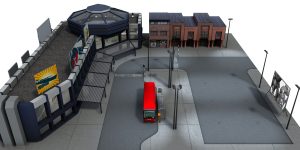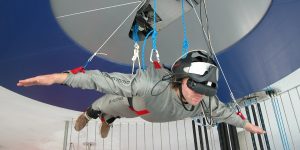Interactive Art
-

pharus
The pharus tracking system was developed at the Ars Electronica Futurelab by researcher and artist Otto Naderer to provide interaction opportunities for any size group of people in virtually any environment.
-

Spaxels
Drone shows and swarm art performances
In September 2012, a new medium for physical-visual expression was born along the banks of the river Danube in Linz: The world’s first large-scale outdoor formation drone flight illuminated the night sky as part and centerpiece of the open-air music festival Klangwolke.
-

ZeitRaum
ZeitRaum (“TimeSpace”) is an interactive art installation the Ars Electronica Futurelab designed for the new terminal at Vienna International Airport. It creates real-time interpretations of arriving and departing flights.
-

Papyrate’s Island
“Papyrate’s Island” is a multi-user interactive narrative on the Deep Space platform that was developed in collaboration with the Media Interaction Lab in Hagenberg. Technically speaking, “Papyrate’s Island” is a cross between a VR environment and a nonlinear animation film.
-

City Puzzle
An interactive simulation environment visualized technological approaches that city planners and architects of the future would be working with. This installation was an expanded spin-off of “Gulliver’s World,” the Ars Electronica Center’s mixed reality environment, and used a simple urban planning model as an example illustrating concrete application possibilities. Visitors could manipulate the various scenarios…
-

Humphrey II
In the beginning, there was Humphrey — a mechatronic device that worked in conjunction with a pair of data glasses to simulate flight in a 3-D environment. This installation in the Ars Electronica Center has been a smash hit with visitors since the museum opened, having replaced almost all the exhibits on display there at…
-

Humphrey I
Humphrey was no conventional flight simulator. It was a special construction that let users fly through virtual worlds. Unlike conventional flight simulators that simulate “flying a vehicle”, “Humphrey” simulated the flying itself… free as a bird, a Superman or Supergirl.
